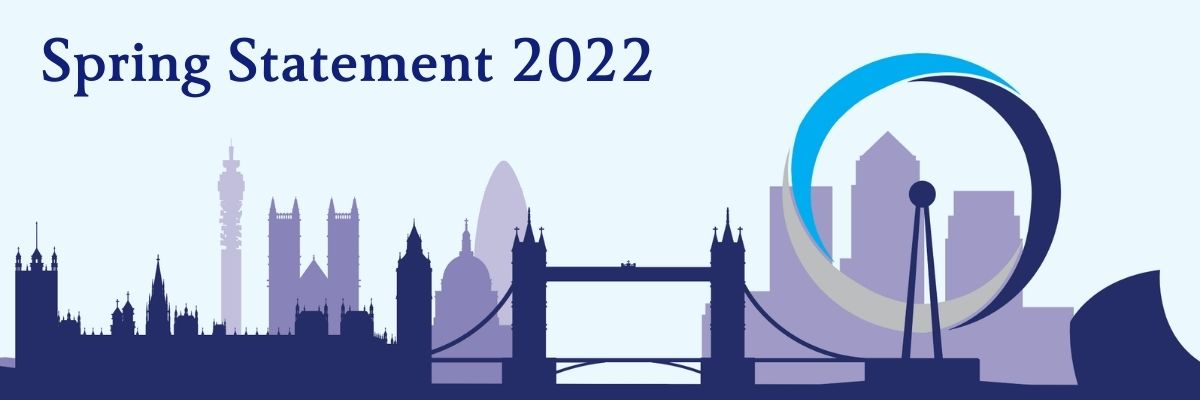Spring Statement 2022 Highlights

It has been two years since the first lockdown announcement, and with COVID-19 restrictions on our daily lives reducing, the Chancellor may have been hoping for a more conventional Spring Statement.
However, Mr Sunak delivered his statement amid a new economic crisis with the invasion of Ukraine, increasing inflation, the rising cost-of-living and the residual impact of COVID-19 all impacting the economy.
With some predicting inflation may reach almost 9% by the end of the year, it was this topic, inflation, that dominated the Spring Statement with support measures being announced for businesses and households facing rapidly rising prices.
Reactions to the Spring Statement are as ever wide ranging. We hope the following highlights, which we feel will be the most significant, will be helpful.
PERSONAL
National Insurance Contributions (NICs): The Government has been under pressure to postpone or even drop its plans to increase National Insurance rates in April. Instead, the Chancellor announced there would be no changes to their existing plans to increase NICs by 1.25% from April 2022. You can read more about this increase here on our website.
However, in a move to lessen the impact of this increase, from July 2022 the threshold at which both employees and those who are self-employed start paying National Insurance will be increased from £9,880 to £12,570 in line with the current Income Tax personal allowance.
Income Tax Basic Rate Band: One of the main headlines of the day was the intention to decrease the tax charged on basic rate income for the first time in 16 years. The rate will fall from 20% to 19%, providing a saving of 1 pence of tax for every £1 earned. This is anticipated to come into effect from April 2024.
This decrease is for England and Northern Ireland. Whether this change will be adopted by Scotland and Wales, who set their own income tax rates, is yet to be seen.
Fuel Duty Reduction: In an attempt to counter the increasing fuel prices, fuel duty charges will be reduced by 5 pence per litre with immediate effect. This rate will be frozen for the next 12 months. The Government states that this will save an average car driver £100 a year, an average van driver £200 a year and an average haulier £1,500 a year.
Household Support Fund Increase: In September 2021 the Government announced that vulnerable families would be able to access a new £500 million support fund to help them cover essential living costs. This “Household Support Fund” will now double to £1 billion from April 2023. This fund will be made available to local councils, who you should contact if you need to check eligibility or obtain further information.
VAT Reduction on Energy Saving Materials: In order to encourage households to become more energy efficient while potentially reducing their energy costs, VAT applied to energy saving materials and devices, such as heat pumps, solar panels, insulation and wind turbines, has been reduced from 5% to 0%. This will take effect from 1 April 2022.
State Pension and Universal Credits: State Pension and Universal Credit payments are scheduled to increase by 3.1% from April 2022. However, with the expected increases in inflation, this will result in many who receive these benefits being worse off.
BUSINESS
Employers Class 1 National Insurance: Although the Class 1 National Insurance threshold is increasing for employees, this will not be the case for employers. Employers will be required to pay 15.05% for employees earning above £9,100 per year, from 6 April 2022. This rate of 15.05% includes the 1.25% increase in NICs to cover the Health and Social Care Levy.
Employment Allowance Increase: The Employment Allowance which employers are able to claim to reduce Class 1 NICs each year will increase from £4,000 to £5,000 from 6 April 2022.
Research and Development (R&D) Relief and Capital Allowances Reform: As mentioned previously in the Autumn statement, the Government is reforming R&D relief, so that it is available against further qualifying expenditure and focuses support towards innovation in the UK. The additional qualifying R&D expenditure will now include cloud computing and data costs, as well as expenditure on “pure mathematics” from April 2023.
In addition, the Government will also be looking to reform capital allowances from April 2023, in order enhance investment into businesses. No details have been announced so far, but the Chancellor indicated his intention to consult with businesses and professional bodies on what this would look like.
Business Rates – 50% Discount for Retail Hospitality and Leisure: The Chancellor highlighted that business rates are to be frozen during 2022/23 and eligible retail, hospitality and leisure businesses will also benefit from a 50% business rate relief. Those of you with good memories may remember that this was announced in last years Autumn Budget, and so may not be considered new news.
Energy Price Rises: Although there have been previous announcements providing protection for some households against energy price rises, these same protections do not extend to businesses. However, the Government are still looking into a UK energy security plan, part of which is to help businesses with the current energy crisis.
UK Economic Growth Forecast: The Office for Budget Responsibility (OBR) has forecast that the UK economy will grow by 3.8% during 2022. This is a huge reduction compared to their previous forecast of 6%. From 2023 going forward, they predict economic growth to be lower still.
As always, the information outlined above is for general guidance purposes only. We appreciate that every individual and business has different circumstances and you should always seek appropriate professional advice before you act on any of the information provided.
If you would like more information on any area referred to in the Spring Statement or require wider business or planning guidance, please do get in touch with your GWA Partner. Alternatively, if you are not a GWA client please do contact us to arrange your free initial meeting.


